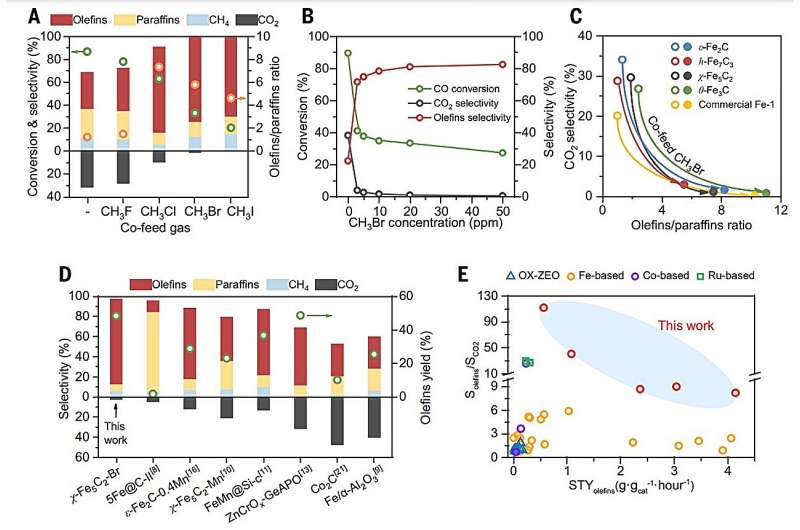Science
Scientists Slash CO2 Emissions in Fuel Production Breakthrough

Scientists have achieved a significant breakthrough in reducing carbon dioxide emissions during the production of liquid fuels from synthesis gas (syngas). In a study published on November 4, 2025, in the journal Science, a research team from China reported that they managed to cut down CO2 production by over 99% during the conversion of crude oil products into fuels using iron catalysts.
The process under investigation, known as Fischer–Tropsch synthesis (FTS), is critically important in the petrochemical industry. It converts syngas, a mixture of carbon monoxide (CO) and hydrogen (H2), into liquid hydrocarbons. Traditionally, the process has been associated with high CO2 emissions, with selectivity rates ranging from 18% to 35%. This new method, however, demonstrates a dramatic reduction in emissions to nearly zero.
Innovative Use of Bromomethane
The key to this innovation lies in the addition of trace amounts of bromomethane (CH3Br) to the syngas feed. This halogen-containing compound significantly alters the catalytic reactions. The introduction of bromomethane resulted in an impressive increase in olefin production, with selectivity rising to 85% of carbon-containing products. Notably, the olefin-to-paraffin ratio improved to 13:1, a substantial increase from the previous ratio of 1.3:1 with unmodified catalysts.
The research team discovered that by co-feeding bromomethane, surface-bound bromine entities formed on the catalyst. These entities blocked two undesired reactions—the water-gas shift and Boudouard reactions—that typically produce CO2 and water as byproducts. This modification allowed olefins to escape the catalyst surface more readily, preventing their conversion into less valuable products.
Long-Term Stability and Future Implications
The modified iron catalyst exhibited remarkable stability, operating effectively for over 450 hours. The researchers emphasized that this practical strategy is compatible with a wide range of iron-based FTS catalysts, including commercially available formulations.
As the world continues to seek greener energy technologies, fossil fuels still represent over 80% of global energy consumption. Thus, enhancing the efficiency and environmental sustainability of processes like FTS is essential. The findings from this study may bridge the gap between fossil fuel chemistry and climate sustainability, paving the way for a more eco-friendly future.
This research represents a promising step forward in addressing the environmental challenges associated with fossil fuel use. By facilitating carbon-neutral conversions of coal and syngas, scientists are moving closer to achieving a balance between energy needs and climate considerations.
The study, led by Yi Cai and his team, emphasizes the importance of innovative approaches in tackling pressing global issues. As they continue to refine these techniques, the implications for the petrochemical industry and beyond could be profound, leading to a cleaner and more sustainable energy landscape.
-

 World3 weeks ago
World3 weeks agoGlobal Air Forces Ranked by Annual Defense Budgets in 2025
-

 World3 weeks ago
World3 weeks agoMass Production of F-35 Fighter Jet Drives Down Costs
-

 Top Stories3 weeks ago
Top Stories3 weeks agoNew ‘Star Trek: Voyager’ Game Demo Released, Players Test Limits
-

 Science3 weeks ago
Science3 weeks agoTime Crystals Revolutionize Quantum Computing Potential
-

 Top Stories3 weeks ago
Top Stories3 weeks agoDirecTV to Launch AI-Driven Ads with User Likenesses in 2026
-

 World3 weeks ago
World3 weeks agoElectrification Challenges Demand Advanced Multiphysics Modeling
-

 Entertainment3 weeks ago
Entertainment3 weeks agoFreeport Art Gallery Transforms Waste into Creative Masterpieces
-

 Lifestyle3 weeks ago
Lifestyle3 weeks agoDiscover Reese Witherspoon’s Chic Dining Room Style for Under $25
-

 Health3 weeks ago
Health3 weeks agoGavin Newsom Critiques Trump’s Health and National Guard Plans
-

 Lifestyle3 weeks ago
Lifestyle3 weeks agoLia Thomas Honored with ‘Voice of Inspiration’ Award at Dodgers Event
-

 Entertainment3 weeks ago
Entertainment3 weeks agoFast & Furious Coaster Hits the Track at Universal Studios
-

 Politics6 days ago
Politics6 days agoLanguage Evolution: New Words Spark Confusion in Communication









